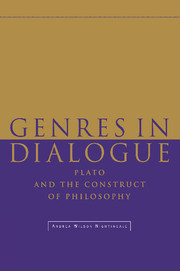Book contents
- Frontmatter
- Contents
- Acknowledgments
- Abbreviations and texts
- Introduction
- 1 Plato, Isocrates, and the property of philosophy
- 2 Use and abuse of Athenian tragedy
- 3 Eulogy, irony, parody
- 4 Alien and authentic discourse
- 5 Philosophy and comedy
- Conclusion
- Bibliography
- General index
- Index of passages from Plato
1 - Plato, Isocrates, and the property of philosophy
Published online by Cambridge University Press: 23 October 2009
- Frontmatter
- Contents
- Acknowledgments
- Abbreviations and texts
- Introduction
- 1 Plato, Isocrates, and the property of philosophy
- 2 Use and abuse of Athenian tragedy
- 3 Eulogy, irony, parody
- 4 Alien and authentic discourse
- 5 Philosophy and comedy
- Conclusion
- Bibliography
- General index
- Index of passages from Plato
Summary
I am prepared for a demand for money and he wants – truth. Truth! And wants it like that – so bare, so blank, as though truth were coin!… However, such modern coin that is only made by stamp, that one needs only to count upon the counting board – that is not truth by any means. Like money into the bag, should one be able to sweep truth into the head?
Lessing, Nathan the WiseSlow Gold – but Everlasting –
The Bullion of Today –
Contrasted with the Currency
Of Immortality –
A Beggar – Here and There –
Is gifted to discern
Beyond the Broker's insight –
One's – Money – One's – the Mine –
Emily DickinsonIn his Lectures on the History of Philosophy, Hegel explains that there is a paradox inherent in the very notion of a “history of philosophy.” As he states in the introduction,
The thought which may first occur to us in the history of Philosophy, is that the subject itself contains a contradiction. For Philosophy aims at understanding what is unchangeable, eternal, in and for itself: its end is Truth. But history tells us of that which has at one time existed, at another time has vanished, having been expelled by something else. Truth is eternal; it does not fall within the sphere of the transient, and has no history.
Although few scholars would now endorse Hegel's solution to the problem of “how it happens that Philosophy appears to be a development in time and has a history,” the tension between philosophy and history still remains.
- Type
- Chapter
- Information
- Genres in DialoguePlato and the Construct of Philosophy, pp. 13 - 59Publisher: Cambridge University PressPrint publication year: 1995
- 3
- Cited by

